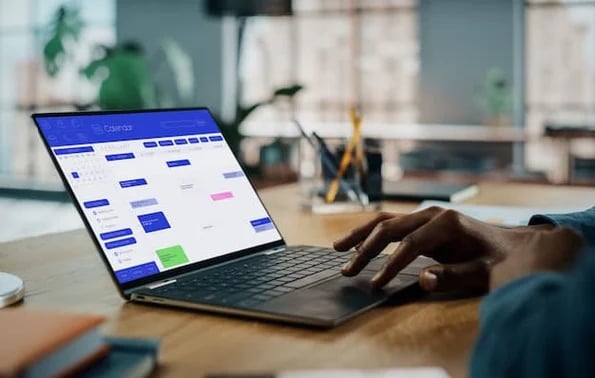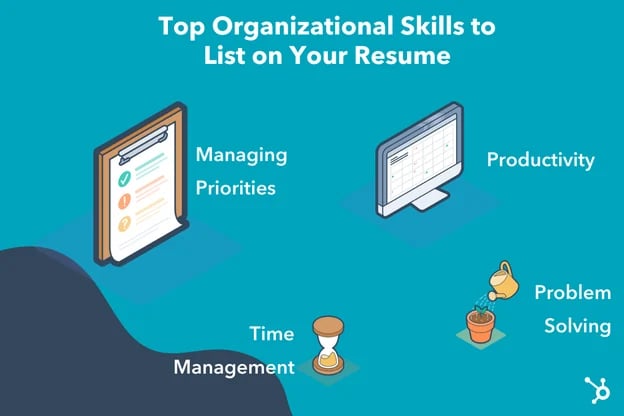Having organizational skills means that you can meet deadlines and be efficient in your workflow management. In fact, organizational skills can be synonymous with energy and time management in most cases.

All of these skills are very important in the workplace and potential employers want to make sure you can stay on top of things.

In this post, we'll dive deep into what organizational skills are, specific examples of what they look like in action, and how to develop organizational skills in the workplace.
- What are organizational skills?
- Importance of Organizational Skills
- Types of Organizational Skills
- Organizational Skills Examples on a Resume
- How to Improve Organizational Skills
- Organizational Skills at Work
What are organizational skills?
Organizational skills mean you have the ability to use your time and resources efficiently and effectively. You're able to manage your time, energy, and physical workspace so you can accomplish tasks successfully.
Organizational skills are about building structure, boosting productivity, and prioritizing the right tasks at the right time.
The antithesis of organizational skills is procrastination, clutter, inefficiency, and miscommunication.
Organizational skills mean you're able to keep yourself calm while coming up with a scheduled plan. Many people with good organizational skills break up projects into smaller goals so they are easier to accomplish.
Importance of Organizational Skills
Organizational skills are important in every area of your life but particularly in the workplace.
Managers want to know that you can handle your tasks, and can work independently. This will help you get promotions and build references when seeking out opportunities in the future.
From a personal perspective, if you don't have a plan in place for how you're going to accomplish something, it will be much harder to achieve it.
You'll need to anticipate how long a task will take, what resources you'll need to complete that task, and have the discipline to block out the necessary time to finish it – that’s where the organization is key.
Types of Organizational Skills
Decision Making
- Strategic planning
- Goal setting
- Problem-solving
- Productivity
- Scheduling
- Data analysis
- Forecasting
- Time management
Teamwork
- Delegation
- Training
- Sharing feedback
- Meeting deadlines
Communication
- Active listening
- Empathy
- Conflict Management
- Persuasion
- Presenting
Organizational Skills Examples on a Resume

When you're listing organizational skills on your resume, you might consider breaking it down into more specific sets of skills. Let's dive into the examples below.
- Communication
- Time management
- Delegation
- Attention to detail
- Decision making
- Strategic planning
- Goal setting
- Creative thinking
- Problem-solving
- Productivity
- Managing priorities
- Teamwork/collaboration
- Deadlines
- Scheduling
- Conflict management
- Office management
How to Improve Organizational Skills
- Own your calendar.
- Make lists.
- Figure out what tools will help you.
- Communicate with your team.
- Declutter your workspace.
1. Own your calendar.
The best way to develop organizational skills is to own your calendar. Block off time where you need to get work done. Then, create a schedule for yourself that is realistic to stick to. It's hard to stay organized when you have random meetings popping up on your calendar.
Additionally, it's important to know how you work best. For example, I like to have meetings back-to-back because it's hard for me to get work done in 30-minute increments between meetings. I want all my meetings in the same time block, so I can block working time and then meeting time.
2. Make to-do lists.
When you have a lot on your to-do list, you can make separate lists for what needs to get done and when.
I usually have a running to-do list where I'll add everything I need to do for the week. Then, I'll break that down into daily to-do lists. You can organize your lists by tasks, meetings, reminders, etc.
Pro-tip: Start by writing down all your tasks then organize them by priority so you know which ones to tackle first.
3. Figure out what tools will help you.
Everyone works differently. That's why it's important to figure out how you work best.
Do you like using a physical calendar or a digital calendar? Regardless, you'll need tools to help you stay organized. Below is a quick list of physical and digital tools to help you get started.
Physical Tools
- Planner
- Calendar
- Notepad
- Folders
- Journals
Digital Tools
4. Communicate with your team.
Another way to develop organizational skills is to communicate with your team. This will not only help you stay accountable but it will also enable your team to support you.
If you're working on a project with several people, you can communicate updates on your part of the project as they occur or at the end of the day. This is a great way to keep the team organized and on task.
5. Declutter your workspace.
Lastly, to truly be organized, your workspace should be free from clutter.
While not everyone likes to keep everything neat and tidy all the time, you should still only have necessary items on your desk so you don't get distracted. This will help productivity and organization overall.
Organizational Skills at Work
Now you might be wondering, "How can I use these organizational skills in the workplace?" and "How can I highlight these skills?"
The first step is to list these skills on your resume when you're applying for jobs. Instead of saying “organizational skills,” list specific ones based on the types outlined above.
If you're in a job interview, think of stories and examples of how you remained organized and how it helped you solve a problem or complete a project successfully. It's important to discuss how you scheduled your time, how you handle multiple assignments, and how you delegate tasks.
While a potential employer might not ask specific questions about organizational skills, you can highlight these stories in questions like "What are your strengths?" and "Why are you a good fit for this role?"
Once you're working for a company, you can highlight your organizational skills during projects or meetings. It's a good idea to use these skills whenever you can because it's sure to impress your boss and help you move forward in your career.
Organizational skills don't just mean that you keep to-do lists. It means you manage your time efficiently, you're productive, can solve problems, and think critically. That's why it's important to develop your organizational skills whenever you can.
Editor's Note: This post was originally published in Sept. 2021 and has been updated for comprehensiveness.




![Leadership Styles: The 11 Most Common & How to Find Your Style [Quiz]](https://blog.hubspot.com/hubfs/leadership-styles-4.jpg)

![The Best Ways to Get Visibility from Your CMO and Other Marketing Execs Who Can Move You Forward [Data]](https://blog.hubspot.com/hubfs/marketing%20manager%20trying%20to%20increase%20marketing%20executive%20visibility%20in%20their%20role.jpg)


![23 Stats We Gained from Surveying Marketing Leaders [New Data]](https://blog.hubspot.com/hubfs/marketing-leadership-trends.jpg)
